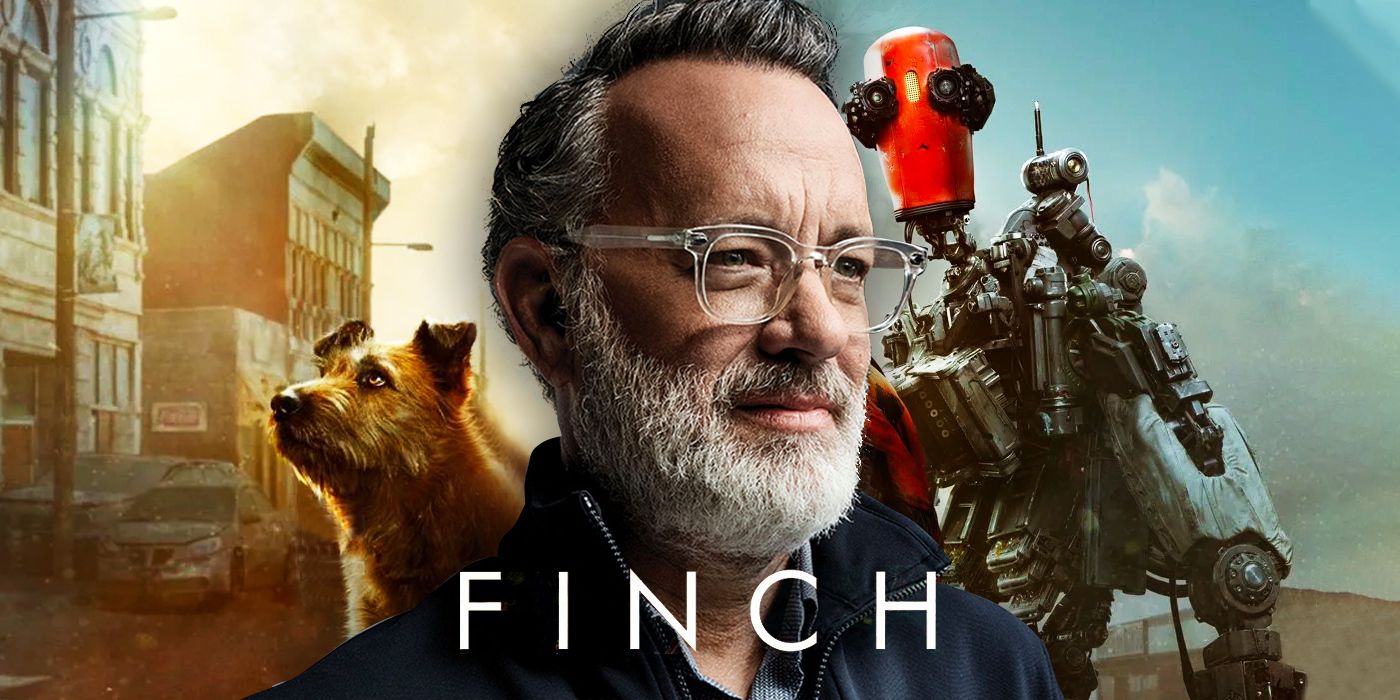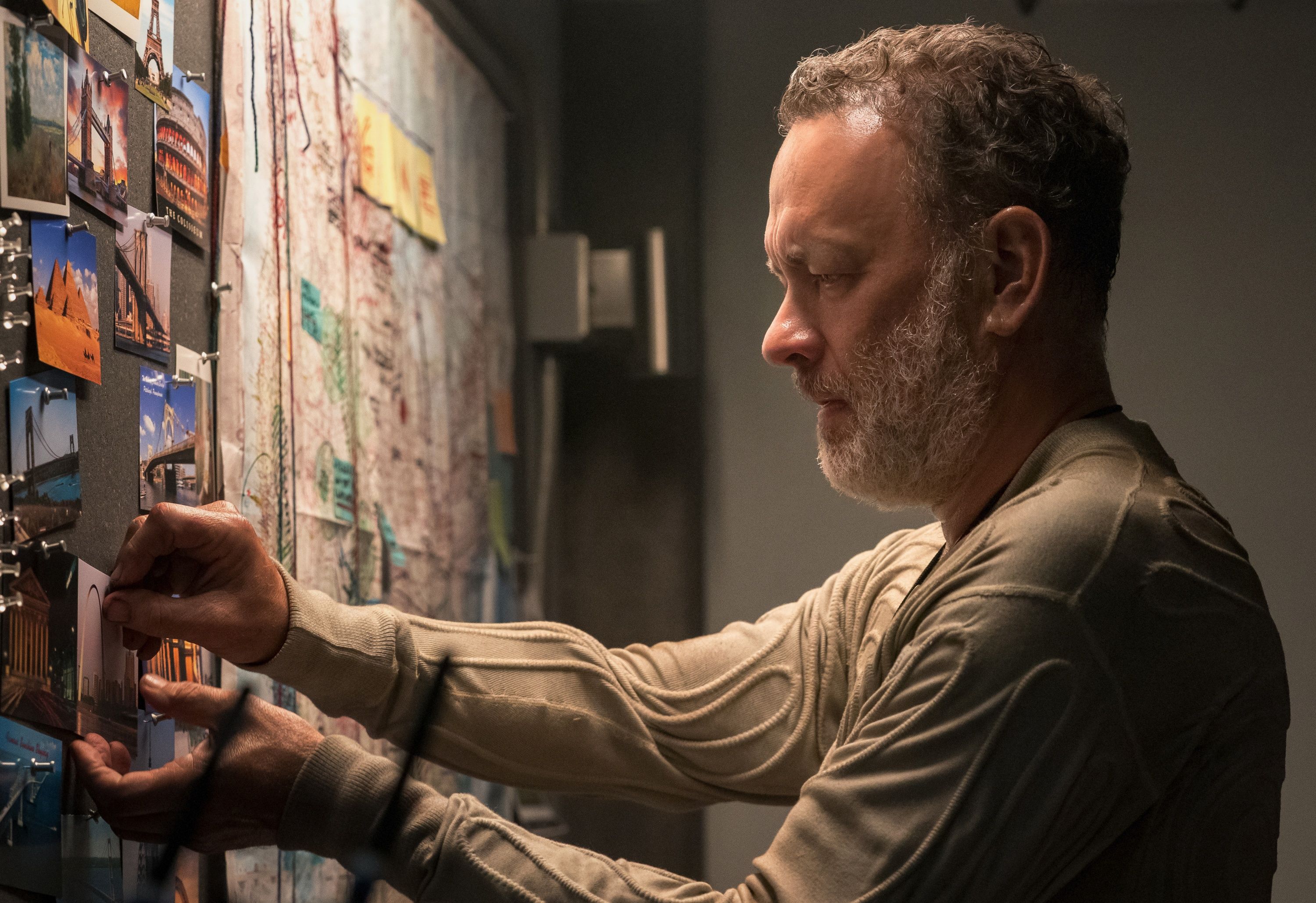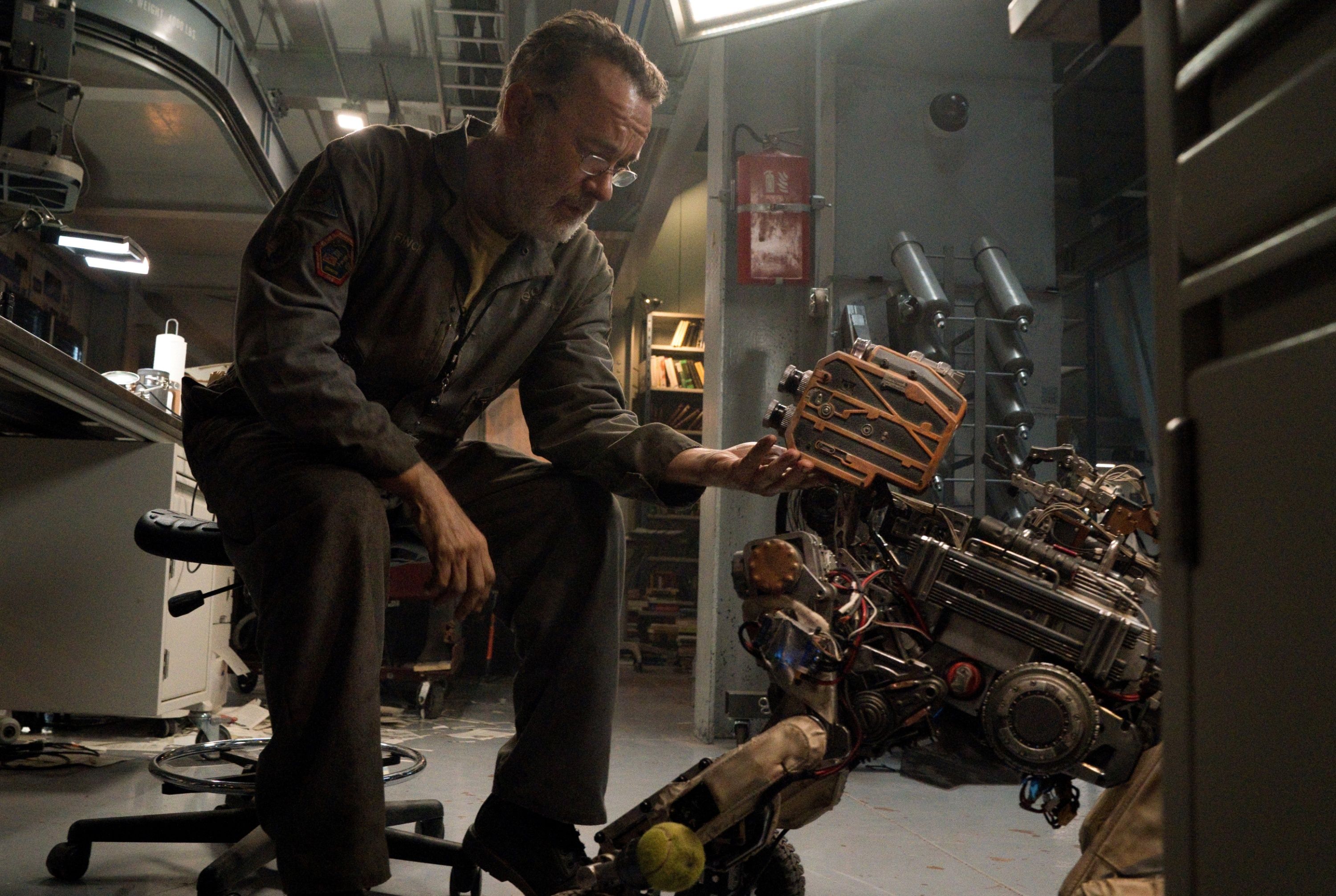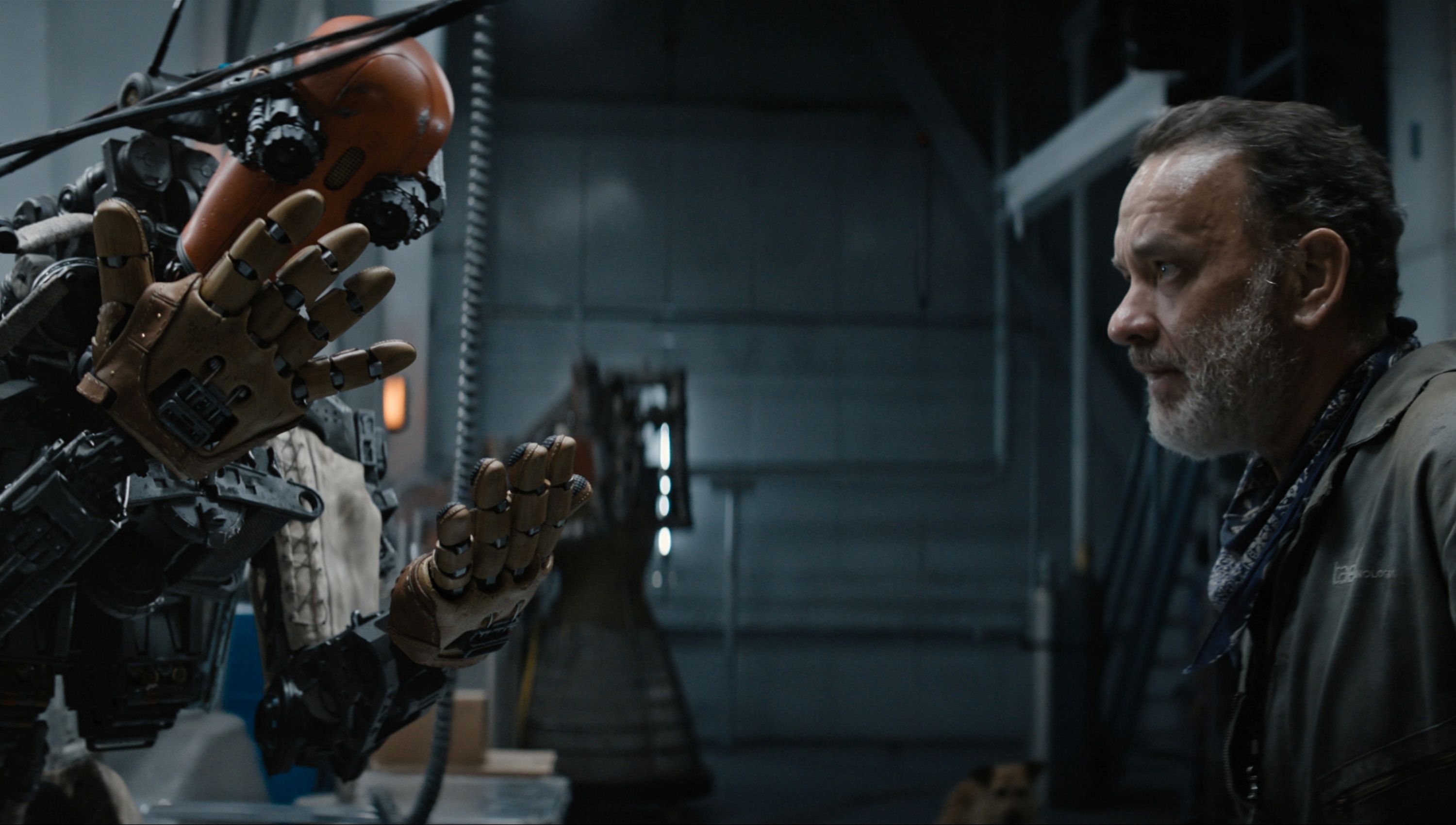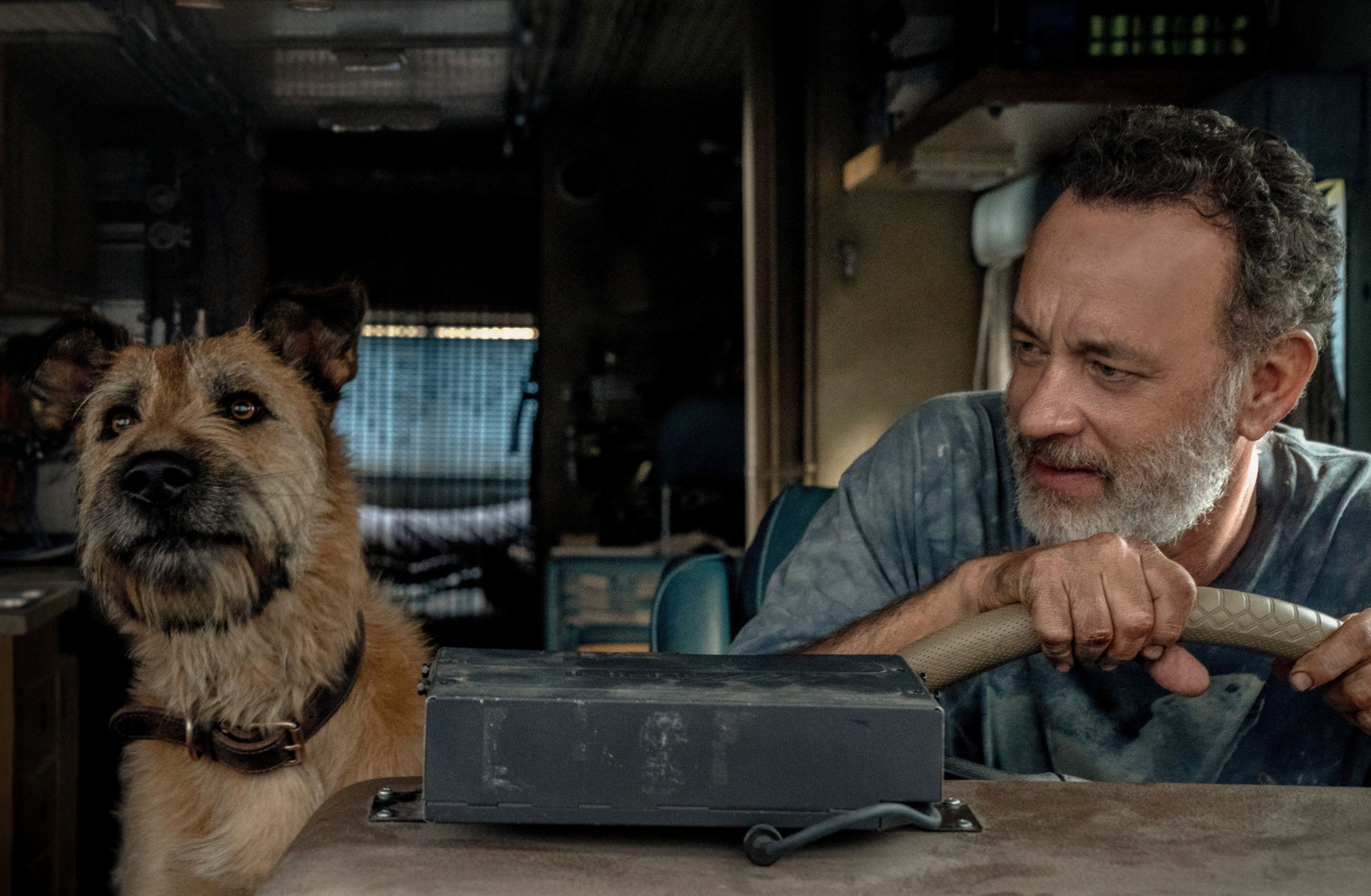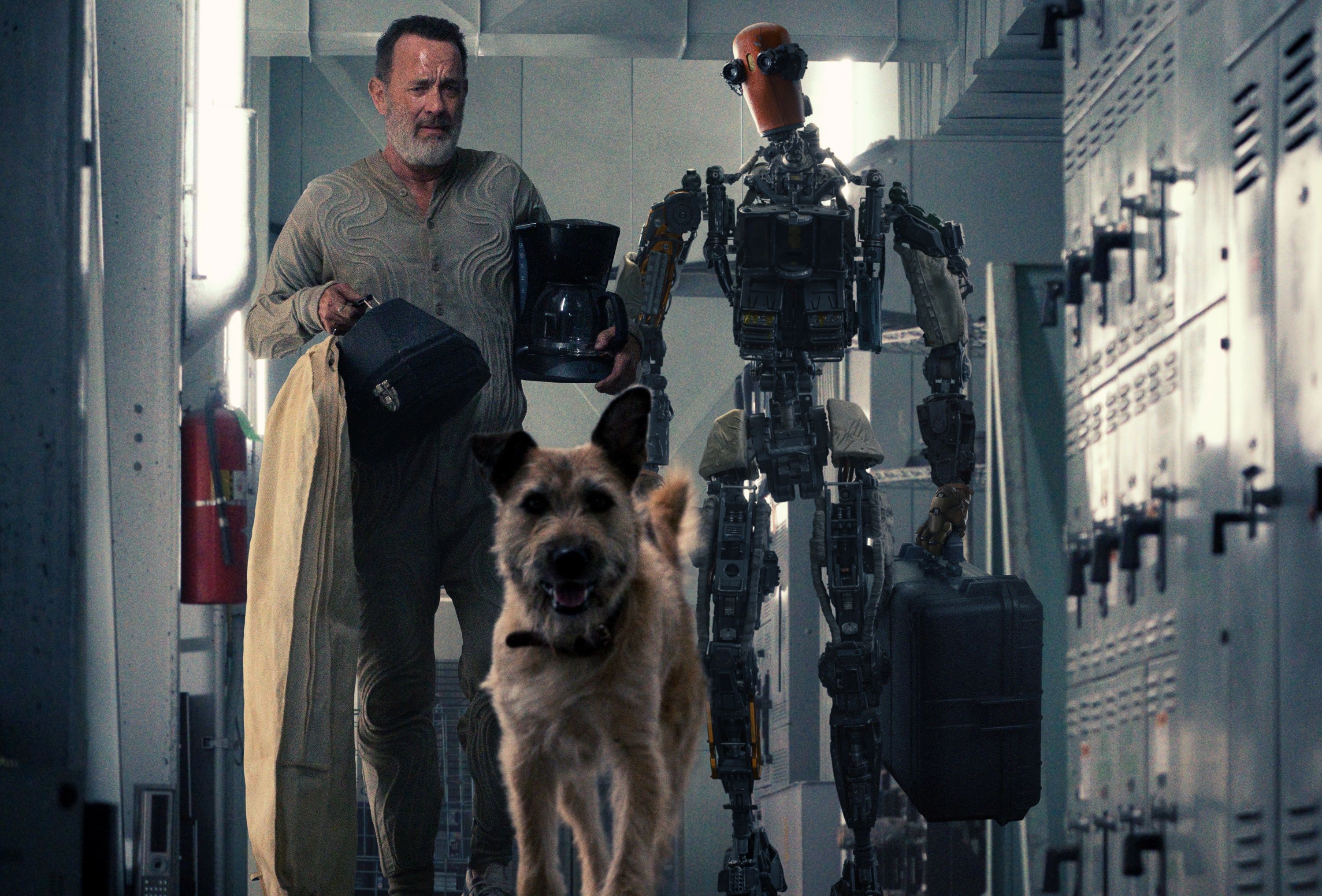From director Miguel Sapochnik, the Apple TV+ original feature Finch is an apocalyptic drama about a man (Tom Hanks) who decides to use his skills as a robotics engineer to create a robot (voiced by Caleb Landry Jones), which names itself Jeff, that can take care of his beloved dog, Goodyear, after he’s gone. Until that time comes, the three journey across the wasteland that’s left as Finch teaches Jeff about what it means to be alive, even if everything is crumbling around you.
During a roundtable that Collider participated in, along with a handful of other media, Hanks talked about the collaborative actor-director relationship he developed with Sapochnik, working and bonding with the dog, the process for finding the robot, blending genres, and whether he sees any connection between Cast Away and Finch.
Question: When you’re pretty much the only person in every scene of the movie, how much more crucial and vital does the actor-director relationship become? What was it about Miguel Sapochnik that made you trust that you were safe in his hands?
TOM HANKS: Miguel is a marvel to me. He’s one of the granddaddies of the Game of Thrones franchise. Every time I saw an episode of Game of Thrones, I would go to him and said, “How did you make that episode? It seems impossible. There are nine million pieces that all have to interlock.” We had the most detailed sit-down rehearsal period of any film I’ve ever been involved, and it was not general. It was specific, with every single beat and every single scene. We started with page one and we had the better part of two weeks to talk about it, and we talked for six hours a day, at minimum, if not more. Sometimes we would only do an eighth of a page pass because the conversation would take us to all of these other things and all of these other permutations of what happened. And then, months later, when we were in the RV or we were on location somewhere in New Mexico, he would come back and, word for word verbatim, remind me of what we had talked about.
My concern was that, after awhile, the audience would flee the theater because they were so sick of seeing me and only me and a dog, and hearing the voice of Caleb Landry Jones by way of the CGI Jeff. There’s no other way of doing that, in which the communication has to be flat-out blatantly pragmatic, “Here’s what must happen and here’s where we have the leeway, and there’s no leeway beyond that.” Like every smart director, he knows what he’s going to use and what’s never gonna make the cut. There were plenty of times where I invested heavily in stuff that was important to me, and he said the smartest thing a director could say to an actor, which was, “Great, go ahead. I love it.” And it’s not in the movie. He knew it wasn’t gonna be in the movie, but at the same time, I got to work out my process.
A lot of times the relationship between an actor and the director is maddening because the director is split between so many things that they must talk about, they must know, and decisions that they have to make. But we started off with a very, very all-encompassing, one-on-one symposium of the story, the character, and the screenplay, from the get-go. We wouldn’t have been able to do that, if this was a big ensemble cast. Because I’m the only guy in the movie, save Caleb Landry Jones when he came along, it was just me and him talking and planning, and me suggesting, and me doing what I was told.
What was your process for bonding and working with this dog?
HANKS: Without a doubt, Seamus’ great handlers were there, every step of the way. There’s a weeks long process, of me spending as much time as possible with Seamus, in which he’s never looking at me. He’s always looking at [his handlers]. That’s just the reality. What comes along, after a period of time, just like with a human being, is that you do get to know each other. Seamus and I were in the same room and in the same RV, for an awful long time together. In there, once he gets used to my smell and my give and take, and the occasionally offering up of a reward for behavior, I got a bit of trust, not me and him, but him and me.
There are photographs of Seamus and I, in between shots, in the back, laying down in the bed, and both of us are taking a snooze. I look like a guy sleeping and he looks like a dog sleeping. He’s got his head up on my leg and I’ve got my arm on his belly, scratching it every now and again. You win something when that happens. All movies are fake. Nobody’s really married to each other, and nobody’s really the boss, and no one’s really having a fist fight, and yet there are always two people that are getting to know each other. To be able to be a guy and his dog, on a great number of occasions with Seamus, was a high country. That’s what you hope to be able to create. When he and I are playing, he really is playing with me. He’s not been instructed, “Play with Tom.” Me and Seamus and the tennis ball, that was nothing but a dog in heaven and me having an awfully good time as well.
You seem like an optimistic, friendly, nice guy, and this is a pretty depressing apocalyptic dystopian story. How was it to imagine a world like that? Did you have to think about how you personally would cope with this apocalypse, or does it feel more like genre-based escapism?
HANKS: None of these things are relief. All of these movies haunt you and demand things of you and you’re not sure you’re gonna be able to sum it up. The screenplay, as written, lacked a cynicism that I think a lot of other movies like this would have. Here’s what it does not have – murderous zombies, blood thirsty bikers from hell, renegade warriors that are gonna rape all of the women and eat all of the children. The tropes, if I dare say so, or the commonalities that an awful lot of these movies have is different. Finch never goes into a subterranean world. The crux of this movie is actually about a guy who’s worried about the survival of this dog, so he builds a robot so that the dog will be taken care of. This is not an optimistic movie at all, but it does lack a cynicism. I think cynicism is a default option. We pay attention to the fact that society collapsed in the movie, by way of some flashbacks, but after that, it takes onto itself the reality, which is that the day is what you make of it. It starts with Finch not just surviving, but surviving for the specific purpose of making sure his dog is safe. That’s not a cynical undertaking, but there’s no brand of optimism at all. It’s gonna be hard work and it’s gonna be a hard slog. If you have lived a life, you realize with a little bit of luck and some effort not being too disappointed, when life kicks you in the teeth, you should be okay and you’ll pull through.
Your career started with you doing comedy, and this film really shows your entire range. There’s almost a buddy comedy road trip aspect to some scenes. Can you talk about blending genres and being able to balance the more serious moments with some comedy?
HANKS: My first job, as an actor, was in a rotating repertory theater, which I think is the greatest job an actor can have because there is such a variety that is demanded of you. You don’t really have to make any choices. Years ago, in 1977 at the Great Lakes Shakespeare Festival, we did six plays a year. There was a comedy, a historical, a tragedy, something contemporary, and something made up. The job of the actor was to live up to the text and the expectations of what each individual play was. When you get into film or television, those are singular decisions that you make. The job is the job, and the text is the text. There’s never been a circumstance where I’ve thought, “It’s time to do a comedy,” or “It’s time to get serious,” or “It’s time to do something historical.”
It’s always about, what does the story examine, by way of the theme that it’s talking about, and then how do we get there? That’s just fun. In every comedy I’ve done, there’s been some serious moments. And in every serious movie I’ve done, there have been some comedic moments. That’s the way life is. The great pleasure of this is that you start all over from square one, as soon as you say yes to a movie, and nothing you’ve done prior to that matters, outside of whatever countenance that you’re carrying along into the movie in the first place. The movie is the movie. This is bleak in the extreme, and yet many of the scenes with that dog and the scenes with Jeff are pleasant to watch because they’re recognizably human. Otherwise you’re just playing the same drag beat, over and over and over and over and over.
At this point in your career, what do you look for, when you’re exploring new projects, and what was it about the Finch script that moved you to want to explore the world of this character?
HANKS: I’m an old man now and it’s hard to get out of bed sometimes, at 5:45 or 5:15 in the morning, but you can’t help it do it because, at the end of the day, this is just the greatest job in the world. There’s nothing that compares to it. Whatever the movie is, it has to reflect what I think my own sense of logic is, true behavior, and true procedure. Anything can happen. The logic of a movie comes and goes and establishes itself. If you’re not going to adhere towards rules of behavior and if you’re not going to obey the standards of protocols and procedures, I don’t know what I, as an audience member, would have to hang onto. Every movie that I have ever seen, that I’ve loved, has promoted the question in me of, what would I do in that same circumstance? Whether it’s The Godfather or Halloween, it’s about, what would I do under these same circumstances? If I don’t know what that is because there’s no logic to it or I don’t understand it, then I’m not invested in what’s going on.
When Finch came along, from the first paragraph to the last, made all the sense in the world to me, provided that I was gonna be on the same page. I thought it was about something very, very specific, which is that this man has no choice, but to do this, every single day, otherwise his dog is not going to be taken care of. That is different. That asks for different behavior and is a different procedure than he must survive, he must kill or be killed, he must get enough water or food, or beat off the bad guys, or escape from peril. There are all of those things there, but they’re recognizable. I don’t think it’s episodic in a way that says, “Okay, now we need an action sequence.” All of the sequences tie together like a good shuffle of the cards. It goes from a man alone, to a man and his dog, to a man, his dog and his robot, to a man, his dog and his robot on the road, all hoping to get to the conclusion before he passes on. I think that’s such beautiful logic that we didn’t even have to think about it. We just had to agree that that’s what we were shooting for.
What was it like to work with Jeff and establish the creation of Jeff through what Caleb Landry Jones brought to the character?
HANKS: Every day, I worked with Caleb. His voice for just a part of it, but literally two days later, Jeff was assembled, and that was Caleb Landry Jones in quite an impossible get-up. We rehearsed together, constantly and all the time. I wasn’t sure that it was gonna work. Miguel, Ivor [Powell], who wrote the screenplay, and Caleb had to manufacture a sensibility to Jeff, out of relative thin air. It was always like, “What does he know?” “Well, he learned the encyclopaedia, he learned these books, he’s AI, et cetera. Miguel was quite the visionary, who was always saying, “He’s responding to you. He’s learning your ethics. He’s you learning your rules. He’s learning your procedures, and yet he’s almost a sentient entity onto himself. The moments that we ended up getting to, through rehearsals and over the long course of shooting, produced surprising results that I didn’t necessarily plan on. There are a couple of scenes that were no different than talk scenes between two human beings, where one guy was dressed up like a robot and the other guy was in old clogs. It almost defies description sometimes.
When you say, “Guide dog robot,” you got a sense of what that robot is going to be. But by the time we get to the end of the movie, Jeff, as Caleb created him, has gone through his pre-adolescence and he’s a teenager about to go off and fend for himself. Usually AI robots end up destroying the people that created them somehow. That goes all the way back to Frankenstein, Colossus: The Forbin Project, and HAL 9000 from 2001: A Space Odyssey, as imagined by Miguel and as brought forward by Caleb. Caleb is an improvisational, free-spirited artist who brought that to this contraption-like device that he was locked into. He ended up going places that were brand new and because of that, the movie went to places that were deeper. At the same time, they were more unpredictable. If you don’t surprise the audience out there with something that they don’t expect, then they’re just seeing something by rote and I don’t think it’s the same experience.
Music plays a large role in this movie. What are your five selections for desert island albums that you would want to listen to?
HANKS: I would have a Julie London album. Julie London was a smoky saloon singer from back in the ‘60s, who did a lot of covers. She was a formidable woman with a formidable voice. I would have to have a very, very, very, very basic 4/4 time rock and roll album, like a collection of Chuck Berry’s greatest hits, not just for the beat and not just for the percussive guitar aspect, but that guy actually wrote lyrics that were incredibly subtle and bits of urban poetry for its time. I’d probably take something by Mr. Bruce Springsteen, probably Darkness on the Edge of Town because that is one major road opera right there. I’d throw in Dusty Springfield. Her Dusty in Memphis record has that English soulful sound, by way of Chess Records out of Memphis. That’s beautiful stuff. And then, if I was gonna be alone, I’d take one of my wife’s records. I’d take a record by Rita Wilson, maybe Bigger Picture.
We’re told that this apocalypse happened because of holes in the ozone layer, which is a very real thing for us. With that in mind, should we see Finch as a stark warning and a taste of what could happen, or should we appreciate it for the relationship between a man, a dog, and the dog’s robot?
HANKS: That’s an interesting question because the place where we actually do make a stab at getting into recognizable human behavior is in the flashbacks to when society was still beginning to crumble. Miguel and I talked a huge amount about what those short sequences were going to be. They had to be recognizable as human behavior, and not just plot device, and it had to communicate how important such a thing as a bag of noodles could be to somebody’s survival, but it also had to reach back into a grander circle of people that we would recognize. If you were all by yourself, what would you do? You’d go into every store and try to make off with a bunch of noodles. But if you were a mother with a daughter and you were trying to do the same thing, what would you do? How would you protect both of you? And if you were a guy with a family somewhere in a car and everybody had guns, all of a sudden, and everybody was fighting for themselves, what position would that put you in?
The ozone and the environmental aspect of it is a huge concern. I did a movie down in Australia and I can’t tell you how many skin clinics exist around there, simply because there is a hole in the ozone down there and skin cancer is a worry for people. All of this stuff has been accumulating all of this time, and if it’s not getting worse, it’s certainly becoming more and more a part of the consciousness because we see the evidence of it. So, you take that and you don’t wanna make a movie that is preaching about something that is common sense, but you do wanna tell a story that is going to try to examine what happens to us all in extreme circumstances. When the screenplay talks about how first everybody tried to pretend it wasn’t existing, then everybody tried to hide, then everybody tried to hoard, and once that ran out, the rules changed. That’s not hard to imagine and it’s really quite horrifying. So, if there is some cautionary tale in Finch, it’s that. What are we gonna do, to and for each other, when the hurricane comes, or the floods come, or the ozone is so bare that the sun can cook a hot dog, just by sitting outside.
It feels like maybe there’s a spiritual connection between Finch and Cast Away, which was also a human story. Did you feel that, in their aims and concerns?
HANKS: To go back in time, because Cast Away took the better part of six years to make happen, so there was a constant ongoing discussion about what we were examining, and myself, (writer) Bill Broyles, and (director) Bob Zemeckis were constantly arguing about it. If you asked us now, each of you would give you three different answers for what it examines. For myself, as one of the originators of Cast Away, that movie is about the best thing that ever happened to this man. He was in a plane crash and lived on an island for four years, and from that came this life that he never would have imagined that he’d have. That’s not the theme of Finch. Nothing great happened to Finch. His time is limited. This dog means responsibility and love, and a whole different connection. The quest for permanence in some brand of eternal effect that Finch is looking for, in creating Jeff the robot, so that he can take care of Goodyear the dog, is a different course in the seminary of solitude versus loneliness and survival versus flourishing.
I am a bit drawn towards these questions of, how much of behavior and protocol can actually define us and save us from ourselves? How do we get to the place where our insides match our outsides? I am drawn to that kind of stuff, not just in movies that I do, but in movies that I watch and am a fan of. It’s extremely different, and yet there is a degree of countenance that goes along with it. There’s a way that Chuck Noland walked around the island searching for food that is reflected in the very first scenes of Finch, where you see this guy in this pressure suit, trying to survive the elements and, hopefully if he gets lucky, there’s some cans of leftover tuna in this store that he’s going into. It’s common turf, but I think it’s a different sermon.
With all of the bits and pieces of Finch’s backstory in this, would you have any interest in doing a prequel to visit that?
HANKS: Oh, wow, I never thought about that, but that could be. I dig any kind of long saga. What you’re saying is that this movie would essentially be chapter two of something like that, and that works. He does tell a couple of very, very vibrant stories about a smart guy who works at a tech company and does all of this magnificent stuff. There hasn’t been any talk about it, but you’d be amazed, how excited a studio can get about something that does well, so who knows? The problem is that I’d be too old to play Finch, so maybe that would be a great role for some guy out there who’s in a little better shape and a little younger than I am. But you never know.
Finch is available to stream on Apple TV+ on November 5th.

